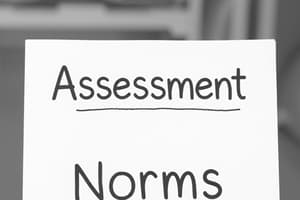Podcast
Questions and Answers
What is one of the primary purposes of self-assessment in students?
What is one of the primary purposes of self-assessment in students?
- To diagnose strengths and needs (correct)
- To confuse the instructional process
- To manipulate grades
- To establish competition among students
Which type of assessment is specifically designed for consistent evaluation over time?
Which type of assessment is specifically designed for consistent evaluation over time?
- Summative assessment
- Diagnostic assessment
- Formative assessment (correct)
- Pre-assessment
What is not a function of assessment according to the content?
What is not a function of assessment according to the content?
- Provide practice applying knowledge
- Gauge program effectiveness
- Inform and guide instruction
- Increase student anxiety (correct)
Which principle of assessment ensures that a test measures what it is intended to measure?
Which principle of assessment ensures that a test measures what it is intended to measure?
Which assessment instrument would be best classified as summative?
Which assessment instrument would be best classified as summative?
Which characteristic defines a reliable test?
Which characteristic defines a reliable test?
What is an example of an authentic assessment?
What is an example of an authentic assessment?
What aspect does not relate to the practicality of a test?
What aspect does not relate to the practicality of a test?
What is a key difference between assessment and testing?
What is a key difference between assessment and testing?
Which of the following best describes authentic assessment?
Which of the following best describes authentic assessment?
What distinguishes norm-referenced tests from criterion-referenced tests?
What distinguishes norm-referenced tests from criterion-referenced tests?
Which of the following is an example of informal assessment?
Which of the following is an example of informal assessment?
Which term describes the ongoing process to ensure course objectives are met?
Which term describes the ongoing process to ensure course objectives are met?
What is a characteristic of formal assessment?
What is a characteristic of formal assessment?
How do criterion-referenced tests benefit test-takers?
How do criterion-referenced tests benefit test-takers?
Which assessment method is likely to provide a continuous indicator of student performance?
Which assessment method is likely to provide a continuous indicator of student performance?
Which factor affects student-related reliability by potentially causing an observed score to deviate from a true score?
Which factor affects student-related reliability by potentially causing an observed score to deviate from a true score?
What is an example of inter-rater reliability issue?
What is an example of inter-rater reliability issue?
Which element can negatively impact test administration reliability?
Which element can negatively impact test administration reliability?
What does content validity measure in a test?
What does content validity measure in a test?
If a teacher uses the communicative approach for teaching speaking but utilizes the audiolingual method for testing, what validity issue arises?
If a teacher uses the communicative approach for teaching speaking but utilizes the audiolingual method for testing, what validity issue arises?
Which of the following best describes criterion validity?
Which of the following best describes criterion validity?
Which situation may lead to a score reflecting a poorly constructed test rather than a student's true ability?
Which situation may lead to a score reflecting a poorly constructed test rather than a student's true ability?
What can bias in scoring lead to in terms of rater reliability?
What can bias in scoring lead to in terms of rater reliability?
What does face validity measure in a test?
What does face validity measure in a test?
Which of the following best describes authenticity in testing?
Which of the following best describes authenticity in testing?
What outcome does washback refer to in testing?
What outcome does washback refer to in testing?
What is a concern related to consequential validity?
What is a concern related to consequential validity?
What aspect of a test does construct validity evaluate?
What aspect of a test does construct validity evaluate?
Which of the following indicates a positive effect of washback?
Which of the following indicates a positive effect of washback?
What is a key characteristic of performance assessment?
What is a key characteristic of performance assessment?
Which of the following is NOT a feature of face validity?
Which of the following is NOT a feature of face validity?
How can self and peer assessments be valuable in learning?
How can self and peer assessments be valuable in learning?
What does accuracy in valid assessments refer to?
What does accuracy in valid assessments refer to?
Flashcards are hidden until you start studying
Study Notes
Introduction to Testing
- Testing is essential for assessing learning and progress.
- Standardized tests like the TOEFL, GRE, and College Board exams are designed to place test-takers on a mathematical continuum, ranking their abilities.
Assessment vs. Testing
- Assessment is an ongoing process that aims to ensure course objectives and goals are met.
- Testing is a form of assessment that allows for the measurement of student achievement.
Types of Assessment
- Informal assessment is unplanned and can take various forms, such as observing students, providing verbal feedback, or making spontaneous comments.
- Formal assessment involves structured exercises or procedures that are systematic and provide a more comprehensive evaluation.
- Traditional Assessment uses pre-determined instruments like multiple-choice, true-false, and matching questions.
- Norm-referenced tests compare students to a norm group, ranking them against others.
- Criterion-referenced tests assess a student's mastery of specific objectives or criteria.
- Authentic assessment is more practical, reflecting real-world scenarios and emphasizing student learning in context.
Purposes of Assessment
- Diagnostic: Used to assess student strengths and weaknesses, identify areas where improvement is needed.
- Formative: Provides ongoing feedback to students, helping them monitor their progress.
- Summative: Evaluates overall learning at the end of a unit or course.
Assessment Instruments
- Pre-Assessment (Diagnostic): Pretests, observations, journals, discussions, questionnaires, interviews.
- Formative (Ongoing): Quizzes, discussions, assignments, projects, observations, portfolios, journal logs.
- Summative (Final): Teacher-made tests, portfolios, projects, standardized tests.
Principles of Assessment
- Practicality: The assessment should be feasible to administer, score, and interpret.
- Reliability: The assessment should produce consistent results over time and across different settings.
- Validity: The assessment should accurately measure what it is intended to measure.
- Authenticity: The assessment should be relevant to real-world tasks and scenarios.
- Washback: The assessment should have positive effects on teaching and learning, avoiding negative impacts like "teaching to the test".
Alternative Assessment Options
- Self and Peer-assessment: Encourage self-reflection and peer feedback.
- Performance Assessment: Assess students' ability to apply knowledge and skills in real-world situations.
Further Considerations for Effective Testing
- Content Validity: Ensure the assessment covers the material and skills taught in the course.
- Criterion Validity: The way specific objectives are measured and targeted with test questions.
- Construct Validity: The assessment should align with the underlying theories and constructs of the subject matter.
- Consequential Validity: The potential impact of the assessment on students, instruction, and overall program effectiveness.
- Face Validity: The assessment should appear reasonable, relevant, and appropriate to the student.
Studying That Suits You
Use AI to generate personalized quizzes and flashcards to suit your learning preferences.





